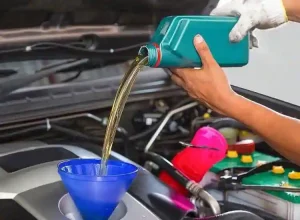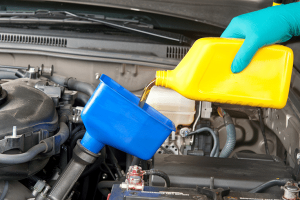In this part, we are going to have the function of recycling the engine oil explained. Any spent oil that is either petroleum-based or synthetic is referred to as “used oil,” which is precisely what the term implies. Our vehicles, lawn mowers, and a variety of other devices would not function properly without the oil. However, even under typical conditions of usage, the oil may get contaminated with contaminants such as dirt, metal chips, water, or chemicals, rendering it incapable of performing its intended purpose. In the end, in order for the task to be successfully completed, the used oil must be changed out for oil that has been purified or refined. If you are one of the people who do their own oil changes, you are responsible for being aware of the correct procedures for handling old oil. After all, a single oil change is responsible for the pollution of one million gallons of fresh water, which is the annual water consumption of fifty persons.

Do you do these tasks independently, such as changing the oil in your automobile at your house? Every year, around 4 million individuals return their used engine oil to recycling centers or utilize it as a lubricant for other types of machinery. If you want to recycle spent oil, you must be cautious not to spill any of the oil while collecting it, and you must put it in a canister or another airtight container. Here we will talk about engine oil recycling and some other issues such as its uses and meaning. If you like to know more about this business and know its wholesale price, don’t hesitate to get in touch with our experts.
Engine oil recycling
Used engine oil may be refined into lubricating and fuel oil and serve as a feedstock source for the petrochemical and oil refining and recycling industries. Additionally, old oil filters contain reusable scrap metal that may be used as original scrap by steel manufacturers. So, how exactly does one get rid of spent oil? For usage in automotive, heavy-duty diesel, and other internal combustion engines, as well as hydraulic and transmission oils, note that refined oils are the most desired alternative and must fulfill the same strict criteria for refining, synthesis, and performance as virgin oils. Be The results of exhaustive laboratory testing and field investigations have led researchers to conclude that re-refined oil is on par with virgin oil. Not only does it pass all of the required tests, but it performs better in certain circumstances than virgin oil.
Consumers and businesses who already use conventional oils have the option of switching to re-refined oils as well. This is because re-refining is nothing more than turning spent oil into new, high-quality lubricants. It is possible to use re-refined oil in any car repair shop, on any vehicle, and in any other mechanical repair shop that requires oil to function. Businesses that maintain fleets and utilize vast quantities of oil may, in certain instances, make arrangements to reuse the same oil that they send for recycling, creating a genuine closed loop. When and where you may dispose of your old oil for recycling, you should check with the car repair business you use, your garbage collector, and the government agency in charge of waste disposal. It is important to remember to clean out and get rid of the old oil filter; in most cases, you can take the filter to the same collection location as the used oil.

Engine oil explained
Here in this part, engine oil is going to be explained. As time passes, the engine oil starts to degrade, loses its ability to do its job, and eventually becomes unable to protect the engine as it should. Small quantities of water may be absorbed by the oil when the engine heats up and cools down. Additionally, the oil can gather dust and debris that enters the engine via the air intake system. Additionally, the oil may react with acids that are produced as a byproduct of water’s reaction with other contaminants. Driving contributes to the pollution of engine oil. However, with time, the oil itself starts to degrade, despite the fact that the oil filter removes debris from the oil which oxidize or thicken. After this time, the oil will no longer be able to function at its full potential, and it will need to be changed.
It is important to replace the oil before it gets polluted to the point where it causes harm to the engine. Because it may be quite difficult to ascertain the amount of oil pollution, manufacturers of automobiles advise setting regular oil replacement intervals. These suggestions are conditional on the model, manufacturer, and production year of the motor vehicle in question. It is vital to have a working knowledge of the mechanics of oil transport in order to prevent oil from ending up in places where it does not belong. Loss of engine oil is influenced both by the design of the engine and the operating circumstances. The majority of the oil flow is either around or through the combustion chamber. It may also go up via the valve or through the piston ring assembly.
Function of engine oil
Over time, engine oil serves various purposes that are essential to the vehicle’s efficient function. The following items top the list in terms of importance:
Cooling from the lubricant; energy is wasted during combustion, and friction between mechanical components raises the temperature of the engine. Through the lubrication circuit, heat is removed from the engine more quickly thanks to the partial lubrication that is given by the engine oil. It replenishes the coolant in the engine, which in turn cools certain components of the engine.
Cleaning; The ability of motor oil to clean is highly essential, despite the fact that few people are aware of it. Deposits on a microscopic scale build-up within the engine and continue to float in suspension. Dust or the byproducts of combustion might make up their composition. In the absence of engine oil, the residue has the potential to block the engine, which will in turn limit its performance. These contaminants are carried incessantly by motor oil flow to the oil filter, where they are caught and held for disposal.

Protection against corrosion; During combustion, corrosive acids are produced, which can potentially deteriorate the engine’s metal components. The rate of corrosion may be slowed down significantly by the addition of additives to contemporary motor oils. However, over a period of time and after coming into contact with oxygen, motor oils may get oxidized and lose their ability to prevent corrosion. Because of this, the oil should be changed at regular intervals.
Sealing; The use of engine oil has been shown to enhance the tightness of the engine, particularly the pistons and cylinders. In order to prevent any gaps from forming between the different components, a protective layer is inserted between them.
Engine oil uses
Oil has the potential to assist vehicle owners in avoiding costly repairs in the first place. If the engine is not properly oiled, it might potentially sustain significant damage. This is exactly what one should anticipate from high-quality motor oil uses. By reducing the amount of friction that occurs between the engine’s components and cleaning the whole engine, engine oil makes it possible to prevent blockages and engine damage. Mechanical parts have a longer service life and are less susceptible to corrosion than electronic ones. As a direct result of this, the engine’s efficiency as well as its service life have both been significantly improved. Check to see that the engine is operating properly; for optimal performance, use an engine that runs on oil. In point of fact, ensuring enough lubrication is very necessary in order to prevent serious mechanical damage. Not only is the performance of the engine affected, but so are the maintenance costs. Lowering fuel use and CO2 emissions Lubricants with a high performance level also contribute to reducing pollution that is released into the environment.
During normal operation, any oil that has accumulated on the stem of the intake valve will be sucked into the combustion chamber. The hot exhaust gas consumes the oil that is located on the stem of the exhaust valve. The engine will draw more oil from the guide into the cylinder if there is an excessive amount of space between the valve stem and the guide. It’s possible that this is brought on by worn valve guides and seals that have fractures, are missing, are damaged, or are improperly fitted. The engine has decent compression, but it goes through a lot of oil because of how it’s designed.
Engine oil meaning
The term “engine oil” has a meaning that refers to the oil that is used to lubricate internal combustion engines of a variety of vehicles. Lubricating moving components is the primary purpose; other benefits include cleaning, protecting against corrosion, enhancing sealing, and cooling the engine by eliminating heat generated by moving parts. Petroleum and other non-petroleum synthetic chemicals are used in the production of motor oil. The majority of modern motor oils are mixed with base oils that are mostly made up of hydrocarbons, poly alpha-olefins, and polyolefins. This ensures that the organic molecules are totally made up of carbon and hydrogen. On the other hand, the base oils used in the production of some high-performance motor oils include twenty percent by weight of esters.

The factors that contribute to a high fuel consumption rate are complicated in many respects. It is essential to keep an eye on changes in gasoline consumption rates since this usage may provide insight into a variety of other circumstances. The context of other data and factors, such as oil analysis, the appearance of exhaust gas, the age of the engine measured in time since the last overhaul, boost pressure, operating temperature, frame load, air leakage, and operating conditions, should be taken into consideration when evaluating these changes. The significance and value of general trends, as well as the ways in which they might assist in problem-solving, will be examined in relation to oil analysis.
Engine oil usage
Consuming excessive oil is nearly often a sign or result of some major mechanical problem in the engine and its usage. This topic is discussed in this article in terms of oil losses that occur throughout the route that the combustion takes as opposed to leaks. While the discussion will mostly center on diesel engines that are used in industrial and commercial settings, a significant portion of what will be covered also pertains to natural gas engines and passenger automobiles.
The usage of oil is a well-documented contributor to the release of pollutants into the environment. Hydrocarbons and particulate matter are expelled via the exhaust tract in the form of oil that has not been completely burned or is only partly burned. In addition, it is well knowledge that the anti-wear chemicals used in engine oil may poison catalytic converters or, at the very least, hinder their effectiveness. This poisoning danger and its impact will increase in proportion to the amount of oil that is burned up in the combustion chamber. This has a negative effect on the surrounding ecosystem.
In this article, we covered a variety of subjects, including the recycling of old motor oil as well as its uses and relevance. If you are interested in learning more about this firm as well as the prices at which it is supplied wholesale, do not be afraid to get in touch with our professionals; in this case, you should not hesitate to do so. We are able to provide the highest level of service while still keeping our prices as reasonable as possible.
Your comment submitted.